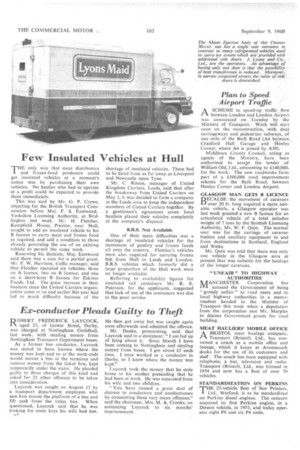Few Insulated Vehicles at Hull
Page 60

If you've noticed an error in this article please click here to report it so we can fix it.
THE only way that meat distributors and frozen-food producers could get insulated vehicles at a moment's notice was by purchasing their own vehicles. No haulier who had to operate at a profit could be expected to provide them immediately.
This was said by Mr. G. P. Crowe, objecting for the British Transport Commission before Maj. F. S. Eastwood, Yorkshire Licensing Authority, at Bridlington last week. Mr. H. Fletcher, Kempfield House, Preston, near Hull, sought to add an insulated vehicle to his B licence to carry meat and frozen food as required, and add a condition to those already governing the use of an existing vehicle to permit the same work.
Reserving his decision, Maj. Eastwood said there was a case for a partial grant. Mr. F. W. Harrison. traffic manager, said that Fletcher operated six vehicles; three on A licence, two on B licence, and one on a short-term B licence for Eskimo Foods, Ltd. The great increase in their business since the United Carriers organization came to an end earlier this year had led to much difficulty because of the shortage of insulated vehicles. These had to be hired from as far away as Liverpool and Newcastle upon Tyne.
Mr. C. Ritson, manager of United Kingdom Carriers, Leeds, said that after the breakaway from United Carriers on May 1, it was decided to form a company in the Leeds area to keep the independent members of United Carriers together. By a gentlemen's agreement seven local hauliers placed their vehicles completely at the company's disposal.
B.R.S. Not Available One of their main difficulties was a shortage of insulated vehicles for the movement of poultry and frozen foods all over the country. Fletcher's vehicles were also required for carrying frozen fish from Hull to Leeds and London. B.R.S. vehicles which formerly did a large proportion of the Hull work were no longer available.
Referring to availability figures for insulated rail containers Mr. R. E. Paterson, for the applicants, suggested that lack of use of the containers was due to the poor service.




















































































































































